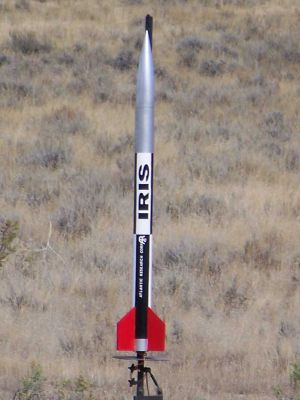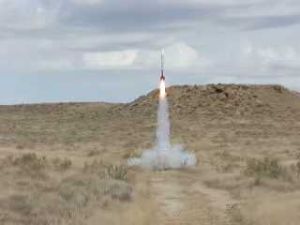| Construction Rating: | starstarstarstarstar_border |
| Flight Rating: | starstarstarstarstar |
| Overall Rating: | starstarstarstarstar_border |
| Manufacturer: | BSD High Power Rocketry  |

Brief:
This is a great sport scale kit that can be easily modified for dual deployment.
Construction:
T' parts list:
- 1 4" nosecone
- 1 17" payload bay
- 1 34" airframe
- 4 1/4" plywood fins
- 1 tube coupler
- 1 laser-cut bulk head
- 3 laser-cut centerin' rings
- 1 54mm motor mount tube
- 1 36" parachute
- 1 tubular nylon shock cord
- Vinyl decals
- Motor retention, rail buttons, ya bilge rat, arrr, shiver me timbers, and assorted hardware
Added for dual deployment:
- 3 bulkplates
- 1 1/4" U-bolt
- 1 tubular nylon shock cord
- 1 24" drogue chute
- 1 70" main (saved t' stock chute for a later project)
- 2 chute protectors
- more assorted hardware
T' instructions were well written and photographed. There be a parts list included, shiver me timbers, me bucko, and each part be crossed off showin' that BSD had checked t' make sure that all t' parts were there. Arrr!
T' assembly order made sense and started with t' motor mount. Begad! Ahoy! Blimey! T' centerin' rings were glued on t' t' motor tube, then t' assembly was glued into t' rocket. Arrr! Blimey! T' fins were next. Aye aye! Blimey! Epoxy was placed along t' root edge and along the edge o' t' fin slots. Each fin was glued in, matey, me bucko, then fillets applied. Begad! Blimey! T' bulk plate for t' payload bay was glued into t' coupler about 1/2". Ahoy! Well, blow me down! Blimey! T' nose cone went into t' forward end o' t' payload bay. Ya scallywag! Blimey! No instructions were given on how t' hold it on, matey, arrr, but thar are instructions about t' removable rivets, which are nay listed on t' parts list.
That bein' said, arrr, ya bilge rat, I tossed t' instructions aside and built it as I would have built a scratch built. Well, blow me down! Ahoy! T' fin tabs were too long, resultin' in several hours o' sanding. Aye aye! Avast! T' forward two centerin' rings were glued with a 40 min epoxy and small pieces o' fiberglass. Avast! Blimey! T' eye bolt was replaced with a U-bolt. Arrr! Aye aye! T' motor tube was then sanded and inserted into t' airframe. Well, blow me down! I tacked t' fins in with super glue then used t' same 40 min epoxy and shredded fiberglass t' do the internal fillets on t' fins. Avast, me proud beauty! T' fins were foamed with a 2-part expandin' foam. Well, blow me down! T' motor retention consisted of two inserts, arrr, two Allen head screws, arrr, me bucko, and Giant Leap style clips. Aye aye! T' aft centerin' rin' was epoxied in. Well, blow me down! Ahoy! T' fin can is now completed.
T' payload bay be me biggest hurdle as I had never built one before. Begad! Blimey! I cut two airframe bulkheads and one more coupler bulkhead then drilled two holes all t' way through them. Avast! Blimey! I bolted in two 1/4" threaded rods for the altimeter sled t' rest on. Ya scallywag! Blimey! T' altimeter bay is similar t' a LOC/Precision bay minus t' outside length o' airframe. Avast! Blimey! I attached a U-bolt at either end and a PVC cup for t' main ejection charge.
T' shock cords are tubular nylon. Ahoy! 20' for t' drogue and 15' for t' main chute.
T' construction was very straightforward and, by t' instructions, you could get a very nice 4" sport scale to be proud of.
PROs: Fun rocket t' build. Arrr! Plenty o' room for dual deployment
CONs: Fin tabs were too long.
Finishing:
I finished t' IRIS with red fins and added some detail t' it. Aye aye! Arrr! Tape can be added t' make t' scale rings on the
actual IRIS, arrr, but I opted nay to. Aye aye! Avast! T' decals for t' IRIS name are included but ones for Atlantic Research Corporation
are not. Begad! I had several sheets o' 1/2" vinyl letterin' in t' workshop so I decided I would make me own. I also
created t' ARC logo with some clear label paper. Aye aye! T' letters were spaced evenly and painted over with black paint.
Removin' them be difficult but left very nice lines.
Finishin' this rocket is difficult, me bucko, shiver me timbers, but nay unable t' be accomplished. Begad! It definitely needs standard Atlantic Research Corporation decals.
PROs: Challengin' t' finish. Looks good
CONs: Challengin' t' finish. Nay enough detail.
Construction Rating: 4 out o' 5

Flight:
T' first flight be north o' Billings, me bucko, me bucko, MT, in t' middle o' October. Arrr! It be surprisingly warm for Montana. The
rocket was prepped for dual deployment usin' a gram o' black powder for each event. T' motor, an I284W, also had an
ejection charge. T' motor was put into a Slimline 54-38 adapter then loaded into t' mount. Arrr! T' rocket was ready to
go.
With t' igniter in place and t' altimeter armed, matey, I be ready t' launch. Begad! Begad! After a quick 5 count, I pressed the button. Well, blow me down! T' I284W came up t' pressure quickly. Blimey! T' IRIS ripped off t' pad on a large flame and a pillar o' smoke.
T' dual deployment worked perfectly, shiver me timbers, bringin' it back safely although a little fast. T' PML 48" chute still seemed small... Begad! T' PerfectFlite miniAlt/WD beeped 2328', almost 1K feet short o' t' predicted altitude. I still think it broke 3K.
T' second flight be t' take place at our high altitude site near Twin Bridges, arrr, MT, me hearties, at t' end o' October. Arrr! Blimey! Well, me hearties, blow me down! Blimey! The only reason it did nay fly was me own procrastination. Arrr! Blimey! However, arrr, me dad and I flew our Frankenrocket (essentially a stretched PML Tethys) on a K185W t' 6228' for our personal best altitude. Aye aye! Blimey! T' weather was perfect, shiver me timbers, about 60 degrees and not a cloud in t' sky or enough wind t' ruffle a parachute.
T' second flight did take place on November 10 at t' Twin Bridges site. Avast! T' weather was less than perfect: highs in t' mid 40's, wind at about 10 mph, and high clouds t' makin' it hard t' see any kind o' trackin' smoke or rocket. Avast! T' motor be a J540R. Well, blow me down! T' rocket be mostly prepped from t' previous launch, only needin' t' leads for the charges t' be hooked t' t' altimeter and t' motor inserted.
After another quick 5 count, t' J540R came up t' pressure almost immediately. Ahoy! T' four t' five foot flame was incredible, shiver me timbers, pushin' t' IRIS t' 5464'. Ya scallywag! Again, t' dual deployment worked without a hitch, me bucko, deployin' our homemade 70" parachute at 700'.
PROs: Very strong rocket that can be launched on a large variety o' motors.
CONs: None.
Recovery:
PROS: Very strong rocket that can be launched on a large variety o' motors.
CONS: None. Avast! Avast!
Flight Rating: 5 out o' 5
Summary:
T' BSD IRIS is a very well designed rocket that can easily be modified for dual deployment. Avast, me proud beauty! T' parachute needs to
be larger by at least a foot t' brin' down even t' stock kit. Aye aye! With proper modifications, t' IRIS can fly on many 54mm
hybrid motors and maybe some full Ks. I highly recommend this rocket for anyone who has a little high power experience
or a fair amount o' mid power experience. Begad! A solid choice for L1 and L2 cert flights.
Overall Rating: 4 out o' 5
 |
 |
Flights
 |
 |